中考英语动词搭配辨析 (5)
重难点08 动词和动词短语-2023年中考英语【热点重点难点】专练(全国通用)(解析版)

专项一词汇重难点08动词和动词短语1.实义动词1.1.常考动词的用法辨析(1)look,see,watch,read的区别:(3)borrow,lend,keep的区别:1.2.及物动词和不及物动词(1)及物动词:可接单宾语、双宾语和复合宾语结构。
When someone gives me money, I feel they don't think at all.give后接双宾语(间接宾语+直接宾语)当有人给我钱时,我感觉他们根本就没有思考。
We elected him monitor of our class.elect后接复合宾语(宾语+宾补)我们选他当我们班的班长。
(2)不及物动词:不及物动词后面一般不可以直接接宾语,但有时不及物动词和介词或副词一起使用,构成动词短语,此时其后可以接宾语。
What will happen without electricity?没有电,会发生什么?I'm waiting for the bus.我正在等公交车。
1.3.延续性动词和非延续性动词(1)延续性动词表示一种可持续的行为过程或状态,可以和表示一段时间的状语连用。
而非延续性动词表示行为或过程在短暂瞬间内完成,不可以和表示一段时间的状语连用。
The film has been on for ten minutes.电影已经开始10分钟了。
The film began ten minutes ago.电影10分钟之前就开始了。
(2)延续性动词和非延续性动词的转换:连系动词指连接主语和表语的动词,主要用来说明主语的身份、性质、特征或状态。
连系动词只有主动形式。
2.助动词助动词本身没有词义或意义不完整,不能单独作谓语,只能和实义动词一起构成谓语,表示时态、语态、语气等,帮助构成否定、疑问、强调或省略等。
3.1.助动词be的用法be用作助动词和用作连系动词一样,有人称、数和时态的变化,主要用来构成进行时态和被动语态。
初中英语动词及动词短语考点
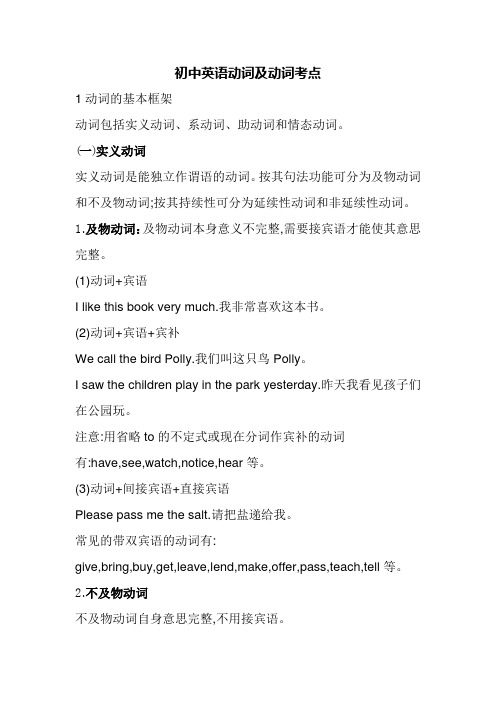
初中英语动词及动词考点1动词的基本框架动词包括实义动词、系动词、助动词和情态动词。
(一)实义动词实义动词是能独立作谓语的动词。
按其句法功能可分为及物动词和不及物动词;按其持续性可分为延续性动词和非延续性动词。
1.及物动词:及物动词本身意义不完整,需要接宾语才能使其意思完整。
(1)动词+宾语I like this book very much.我非常喜欢这本书。
(2)动词+宾语+宾补We call the bird Polly.我们叫这只鸟Polly。
I saw the children play in the park yesterday.昨天我看见孩子们在公园玩。
注意:用省略to的不定式或现在分词作宾补的动词有:have,see,watch,notice,hear等。
(3)动词+间接宾语+直接宾语Please pass me the salt.请把盐递给我。
常见的带双宾语的动词有:give,bring,buy,get,leave,lend,make,offer,pass,teach,tell等。
2.不及物动词不及物动词自身意思完整,不用接宾语。
Horses run fast.马跑得快。
(1)有些动词既可作及物动词又可作不及物动词。
We study English.我们学习英语。
(及物动词)We study hard.我们努力学习。
(不及物动词)(2)有些不及物动词与一些别的词搭配在一起构成动词短语,它的作用相当于一个及物动词。
①动词+介词Listen to the teacher carefully.仔细听老师讲。
此类动词短语后面的宾语无论是名词还是代词,都只能放在介词后面,不能放在动词和介词之间。
②动词+副词+介词Let’s go on with our work!让我们继续我们的工作吧!He gets along well with his classmates.他与他的同学们相处得很好。
【中考英语复习之语法过关(人教版)】课时05 谓语动词的时态 语态和主谓一致(教师版)

第五课时谓语动词的时态、语态和主谓一致动词时态历来是中考考查的重点。
动词时态考查虽多,但考向非常集中,最常考的是一般过去时和一般现在时,其次是现在完成时,其他时态考查相对较少。
因此备考重点是:①动词时态的基本用法①动词语态的基本用法①主谓一致考点1动词的时态(1)一般现在时①表示经常或习惯性的动作,多用动作动词,且常与表频率的时间状语连用。
We have meals three times a day.我们一日吃三餐。
①表示客观真理、科学事实及自然现象。
The sun sets in the west.太阳从西方落下。
①在时间、条件状语从句中常用一般现在时代替一般将来时。
I’ll write to her when I have time.有时间我会写信给她。
1.Mike often (收集)stamps and plays basketball in his spare time.【答案】collects本题考查动词的时态。
由and plays可知,此空为一般现在时,主语Mike为第三人称单数,故谓语动词应用第三人称单数形式。
2.And then it just (grow) and makes the world a better place.【答案】grows本题考查动词的时态。
此处主语it为第三人称单数。
由于and连接的前后两个动词为并列关系,根据makes可知时态为一般现在时,故填grows。
3.We can see clearly that Mongolia (位于) between China and Russia on the map. 【答案】lies句意:我们在地图上可以清楚地看到蒙古位于中国和俄罗斯之间。
本题考查动词的时态。
时态用一般现在时,Mongolia是第三人称单数,因此从句的谓语动词用第三人称单数形式。
4.Mary is crazy about reading. She b a lot of books from the school library every time.【答案】borrows句意:Mary酷爱阅读。
中考英语必考动词的分类及辨析
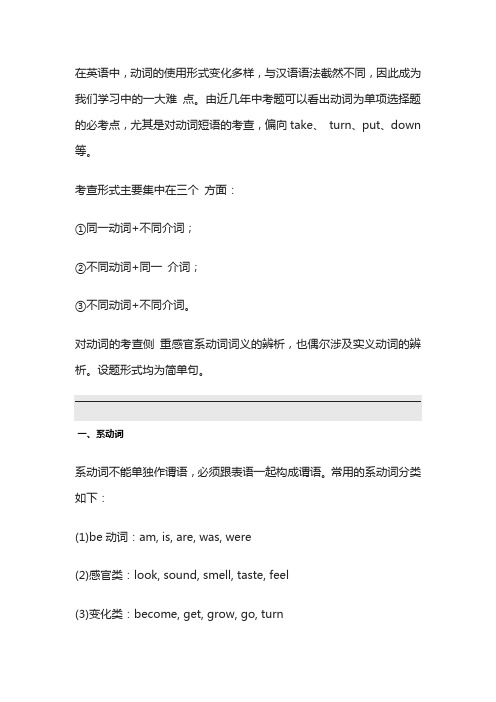
在英语中,动词的使用形式变化多样,与汉语语法截然不同,因此成为我们学习中的一大难点。
由近几年中考题可以看出动词为单项选择题的必考点,尤其是对动词短语的考查,偏向take、turn、put、down 等。
考查形式主要集中在三个方面:①同一动词+不同介词;②不同动词+同一介词;③不同动词+不同介词。
对动词的考查侧重感官系动词词义的辨析,也偶尔涉及实义动词的辨析。
设题形式均为简单句。
一、系动词系动词不能单独作谓语,必须跟表语一起构成谓语。
常用的系动词分类如下:(1)be动词:am, is, are, was, were(2)感官类:look, sound, smell, taste, feel(3)变化类:become, get, grow, go, turn(4)状态类:keep, stay二、助动词助动词本身没有词义,不能单独作谓语,只能和其他动词一起构成谓语,表示时态、语态、语气等特征,共同构成否定、疑问、强调、省略等句子。
主要的助动词有be, have, has, had, do, does, did, will, would 和shall等。
三、实义动词实义动词是能独立作谓语的动词。
按其语法作用分为及物动词和不及物动词;按其持续性可分为延续性动词和非延续性动词。
1.及物动词及物动词本身意义不完整,需要接宾语才能使其意思完整。
(1)动词+宾语如:Can you open the window?(2)动词+宾语+宾补如:We call him Bill.I saw Tom play in the park yesterday.注意:用省略to的不定式或现在分词作宾补的动词有make, let, see, watch, hear, notice等。
(3)动词+间接宾语+直接宾语如:May I ask you a question?Please pass me the book.常见的带双宾语的动词有:give, bring, buy, get, lend, offer, pass, teach, tell, write, return等。
中考英语固定搭配大全
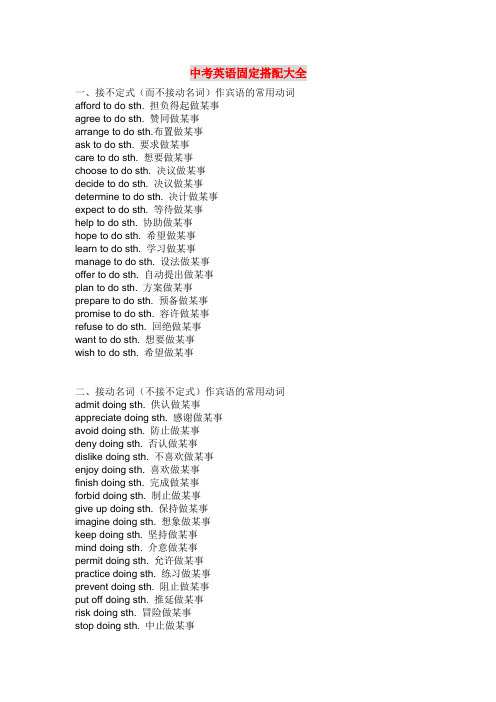
中考英语固定搭配大全一、接不定式(而不接动名词)作宾语的常用动词afford to do sth. 担负得起做某事agree to do sth. 赞同做某事arrange to do sth.布置做某事ask to do sth. 要求做某事care to do sth. 想要做某事choose to do sth. 决议做某事decide to do sth. 决议做某事determine to do sth. 决计做某事expect to do sth. 等待做某事help to do sth. 协助做某事hope to do sth. 希望做某事learn to do sth. 学习做某事manage to do sth. 设法做某事offer to do sth. 自动提出做某事plan to do sth. 方案做某事prepare to do sth. 预备做某事promise to do sth. 容许做某事refuse to do sth. 回绝做某事want to do sth. 想要做某事wish to do sth. 希望做某事二、接动名词(不接不定式)作宾语的常用动词admit doing sth. 供认做某事appreciate doing sth. 感谢做某事avoid doing sth. 防止做某事deny doing sth. 否认做某事dislike doing sth. 不喜欢做某事enjoy doing sth. 喜欢做某事finish doing sth. 完成做某事forbid doing sth. 制止做某事give up doing sth. 保持做某事imagine doing sth. 想象做某事keep doing sth. 坚持做某事mind doing sth. 介意做某事permit doing sth. 允许做某事practice doing sth. 练习做某事prevent doing sth. 阻止做某事put off doing sth. 推延做某事risk doing sth. 冒险做某事stop doing sth. 中止做某事suggest doing sth. 建议做某事三、接动词原形作宾补的常用动词hear sb. do sth. 听见某人做某事let sb. do sth.让某人做某事listen to sb. do sth. 听着某人做某事look at sb. do sth. 看着某人做某事make sb. do sth. 使某人做某事see sb. do sth. 看见某人做某事watch sb. do sth. 察看某人做某事四、接不定式或动名词作宾语意思相反动词like to do sth / like doing sth. 喜欢做某事love to do sth / love doing sth. 喜欢做某事hate to do sth / hate doing sth. 憎恶做某事prefer to do sth / prefer doing sth. 宁可做某事begin to do sth / begin doing sth. 开端做某事start to do sth / start doing sth. 开端做某事continue to do sth / continue doing sth. 持续做某事七、接不定式或动名词作宾语意思不同的7个动词(1) remember to do sth. 记住要做某事remember doing sth. 记住曾做过某事(2) forget to do sth. 遗忘要做某事forget doing sth. 遗忘曾做过某事(3) regret to do sth. 懊悔(遗憾)要做某事regret doing sth. 懊悔(遗憾)曾做过某事(4) try to do sth. 设法要做某事try doing sth. 做某事试试看有何效果(5) mean to do sth. 计划做某事mean doing sth. 意味着做某事(6) can’t help to do sth. 不能协助做某事can’t help doing sth. 禁不住做某事(7) go on to do sth. 做完某预先接着做另一事go on doing sth. 持续做不断在做的事注:stop to do sth. 与stop doing sth.也不同,前者指停上去去做某事,后者指中止正在做的事,但001. a bottle/glass/cup… of 一瓶/茶杯/玻璃杯002. a few 一些003. a kind of 一种;一类004. a little 一点;少量005. a lot of…(lots of…) 许多的006. a moment later 片刻之后007. a number of 若干的;许多的008. a pair of 一双;一副009. a piece of 一块(张;片;只)010. all day(long) 整天;一天到晚011. all kinds of 各种各样012. all one’s life一生;终生013. all over 到处;结束014. all over the world 全世界015. all right 行了;好吧;(病)好了016. all the same 仍然017. all the time ①一直;始终②老是(美国英语)018. arrive at/in 到达某地019. as…as… 一样020. as…as one can(=as…as possible) 尽量021. as soon as 一就022. at breakfast 早餐时023. at first 起先;开始的时候024. at home 在家025. at last 最后;终于026. at night 在夜里027. at noon 在正午028. at once 立刻;马上029. at school 在学校上课030. at the back of 在……的后面031. at the head of 在……的前面032. at the moment 此刻033. at the same time 同时034. at this time of (the) year 在(一年中)这个时节里035. at times 时常;有时036. at work 在工作037. be able to do sth. (= can+V.) 能够038. be angry with sb. 生某人的起be angry at/about sth. 生某事的气039. be born 出生040. be different from… 和……不同041. be full of 充满着……042. be good at 善于be bad at拙于043. be good for 对……有益的be bad for 对……有害的044. be in hospital 生病;住院be in the hospital 在医院045. be late for 迟到046. be like 像047. be made of (be made from) ……制的;用…….制成的048. be/get ready 准备好049. be sure 肯定;确定050. break down ①(机械)损坏②拆散(某物)051. by+交通工具搭乘某交通工具052. by the way 顺便一提053. by then 到那时054. catch (a) cold; have a cold 感冒055. change one’s mind 改变想法(注意)056. come back 回来057. come down 下来058. come from ①出生于②来自于059. come in 进入;进来come out 出来060. come over 过来;顺便来访061. come around (走)过来(绕行而来)062. day after day 日复一日地;天天063. do(es) +V.ing 做某事064. do sport 运动;参加(体育)运动065. does well ①做得很好②成功③成绩很好066. each other 互相067. eat up 吃完068. either…or… 不是……就是069. enjoy oneself 过得愉快070. fall behind 落后;跟不上071. fall off ①跌落;掉下②(质或量)下降072. far away 遥远073. feel like doing sth. 想要做某事074. feel tired 感到疲劳075. find out 查明;发现;了解076. from now on 从今以后;今后077. from … to … 从……到……078. get back ①返回②取回079. get down ①下来;落下②记下来080. get dressed 穿衣服081. get home 大家082. get into ①进入②搭乘(出租车)③陷入(坏的情况)083. get off ①下车②起飞084. get on ①上车②生活085. get on (with…)= get along (with…) ①生活②与(某人)相处③(活动)有进展086. get out of ①从......出来②从出租车(轿车)下来087. get ready to do sth. 准备做某事088. get up ①起床②起立089. get warm (long) 变暖和(长)090. give a call 给……打电话091. give back 归还;送回092. go back 回去093. go for a walk 散步094. go home 回家095. go on 继续096. go shopping 去购物097. go to bed 睡觉(并未入睡)098. go to school 上学099. go to sleep 入睡;睡着100. go to the cinema 看电影101. grow up 成年;长大成人102. half an hour 半小时103. have a drink of 喝一点……104. have good time 玩得很高兴;过得愉快105. have a look (at) 看一看106. have a match 比赛have a test 测验107. have a meeting 开会108. have a rest 休息109. have a swim 游泳110. have a talk 谈话111. have a walk 散步112. have a wash 洗(手,脸等)113. have breakfast 吃早饭114. have lessons/classes 上课115. have lunch 吃午饭116. have sport 进行体育活动117. have supper 吃晚饭118. have to 不得不;必须119. hear from+sb. 收到某人的来信120. hear of 听说121. help sb. with sth 在某事上帮某人help sb. (to) do sth. 帮助某人做某事122. hold a meeting (= have a meeting) 举行会议123. hold on ①等一等(别挂电话)②坚持;持续124. hour after hour 一小时又一小时地;持续地125. how long ①(时间)多长;多长②(长度)多长126. how many/much 多少/多少(钱)127. how often 多久;多常128. how old 几岁;多大(年纪)129. hundreds of 数百130. hurry of 匆匆离去;赶快去131. hurry up 赶快132. in a minute 一会儿;立刻133. in bed 躺在床上134. in English 用英语(说)135. in front 在前方(面);在正对面136. in front of 在......前面137. in time 正好;及时138. in the middle of 在……中间139. jump into 跳进……140. just a moment 等一会儿141. just then 正在那时142. keep busy (一直)忙碌143. last year 去年144. later on 过后;以后145. laugh at 嘲笑146. listen to 听……(讲话)147. look after 照料;照顾148. look at (注视着)看;观看149. look for 寻找150. look into 往……里看151. look like 看起来像152. look over (医生)检查153. look the same 看起来很像154. lots of 许多;很多;大量155. make friends with 与……交朋友156. make sure 务必157. middle school 中学158. move away 搬开;搬走159. move to 搬到160. neither… nor… 既不……也不161. never mind 不要紧;没关系162. next time 下次163. no longer (=not…any longer) 不再164. not … at all 一点也不;根本不(用来加强not的语气)165. not at all 不用谢;别客气166. not so … as 不像;不如167. on foot 走路;步行168. on show 展览;被陈列着169. on the earth 在地球上170. on the (one’s) way 在途中;在路上171. on time 按时;准时172. out of 在……之外;从……里头173. over there 在那边;在对面174. Party member 共产党员175. pass on 传递176. pay for付钱;支付;付出代价177. play with 玩耍178. post office 邮局179. pull out 扑灭/ put off 推迟脱下180. pull …up from 把……从……拉上来181. put on 穿;戴上;增加182. right away 立刻;马上183. right now 现在;刚刚184. send away 撵走;开除;解雇185. send up 发射186. sit down 坐下187. so …that 如此……以致……188. speak to sb. 与……佳话189. spend some time on 在……花时间190. stop sb. from doing sth. 阻止某人做某事191. take a rest 休息192. take a walk 散步193. take away 拿走194. take down 取下195. take exercise 锻炼(身体)196. take off 脱掉衣物197. take one’s time ①不急;慢慢干②用去(某人)时间198. take part in 参加199. take/have some medicine 服药200. take the train/a boat/a bus…坐火车/船/公共汽车…… 201. talk about 谈论202. talk to 与……谈话203. teach oneself 自学204. tell (sb.) about 告诉(某人)……205. the other(s) 另一个(其他的)206. think about 考虑(是否去做)207. too …to 太……不能……208. try on 试穿;试试看209. turn green 变绿210. turn off 关掉(自来水,电灯,收音机等)211. turn on 开;旋开(电灯,无线电等)212. up and down 上上下下;来回地213. very much 很;非常214. wait for 等候;等待215. wear out 穿坏;穿旧;用尽216. with one’s help 在(某人)帮助下217. work on ①从事……工作②继续工作③研究218. worry about 担心;着急219. write down 写下;记下(完整)人教版初中英语动词固定搭配一. 只接不定式(不能接动名词)作宾语的25个常用动词1. want to do sth. 想要做某事I want to buy a new computer this afternoon.2. would like to do sth.想要做某事I would like to invite you to come to my birthday party this Saturday.3. wish to do sth. 希望做某事I wish to live on the moon one day.4. help to do sth. 帮助做某事I often help to do some chores at home.5. hope to do sth. 希望做某事I hope to have a good rest this weekend.6. learn to do sth. 学会做某事He finally learned to play the piano with the help of the teacher.7. manage to do sth. 设法做成某事They managed to escape the fire yesterday.8. offer to do sth. 主动提出做某事Never offer to teach fish to swim.9. plan to do sth. 计划做某事He plans to travel around the world.10. afford to do sth. 负担得起做某事(时间或金钱方面)We can’t afford to go abroad this summer.11. agree to do sth. 做某事He agreed to do it at once.12. arrange to do sth.安排做某事I arrange to wash clothes tomorrow morning.The boy asks to go to school by bike.14. beg to do sth. 恳求做某事He begged not to be put into prison.15. care to do sth. 愿意/喜欢做某事16. choose to do sth. 选择做某事He chose to believe what she had said.17. decide to do sth. 决定做某事She has decided to travel all over the world.18. demand to do sth. 要求做某事19. determine to do sth. 决心做某事He determined to learn French.20. expect to do sth. 等待做某事I am expecting to hear from you soon.21. fear to do sth. 惧怕做某事She fears to live on the mountain.22. prepare to do sth. 预备做某事They prepared to go hiking this Sunday.23. pretend to do sth. 伪装做某事She pretended not to see me.24. promise to do sth. 答应做某事I have promised to give the children some books.25. refuse to do sth. 拒绝做某事She refused to buy a new cellphone for her boy.二. 只接动名词(不能接不定式)作宾语的28个常用动词1. practice doing sth. 练习做某事I practice playing the piano twice a week.2. consider doing sth. 考虑做某事I consider waiting a bit longer before I give up.I enjoy playing basketball.4. finish doing sth. 完成做某事Let's finish doing the work together.5. give up doing sth. 放弃做某事My father has given up smoking.6. imagine doing sth. 想象做某事I can't imagine marrying such a woman.7. keep doing sth. 一直做某事I kept studying English for 1 hour yesterday evening.8. put off doing sth. 推迟做某事Sometimes students put off doing their homework until the last minute.9. risk doing sth. 冒险做某事To win the gamble,he risked losing 100 dollars.10. suggest doing sth. 建议做某事I suggest traveling abroad next month.11. admit doing sth. 承认做某事He admitted making the mistake.12. advise doing sth. 建议做某事He advises going to see a movie.13. allow doing sth. 允许做某事We don't allow smoking in the classroom.14. appreciate doing sth. 感谢做某事We shall appreciate hearing from you again.15. avoid doing sth. 避免做某事Try to avoid drinking and smoking.16. delay doing sth. 拖延做某事Why have you delayed writing to him?17. deny doing sth. 否认做某事John denied signing the contract.18. discuss doing sth. 讨论做某事I like to discuss doing sports with my friends.19. dislike doing sth. 不喜欢做某事He dislikes dancing in public.20. escape doing sth. 逃脱做某事He escaped being killed.21. excuse doing sth. 原谅做某事He can't excuse coming late for work.22. fancy doing sth. 想象/喜爱做某事Are you fancy buying some food with me?23. forbid doing sth. 禁止做某事They forbid parking here.24. mention doing sth. 提及做某事He mentioned watching TV.25. mind doing sth. 介意做某事Would you mind opening window?26. miss doing sth. 错过做某事The thief missed being caught yesterday.27. permit doing sth. 允许做某事We do not permit smoking in the office.28. prohibit doing sth. 禁止/阻止做某事They prohibit smoking in public.三. 既可接不定式也可接动名词,但含义完全不同的8个动词1. remember to do sth. 记住要做某事(未做)remember doing sth. 记得做过某事(已做)Remember to close the door,please.I remember closing the door.2. forget to do sth. 忘记去做某事(未做)forget doing sth. 忘记做过某事(已做)The light in the office is stil on. He forgot to tu rn it off.He forgot turning the light off.3. regret to do sth. 遗憾要做某事(未做)regret doing sth. 后悔/抱歉做过某事(已做)I regret to tell you that you can't pass the examination.I regret disturbing yo so long.4. try to do sth. 努力做某事try doing sth. 尝试做某事He tries to get the apple above the shelf. But fails to reach it. After a while ,Brown comes in and try showing his ability.5. mean to do sth. 计划做某事mean doing sth. 意味着做某事I meant to go, but my father would not allow me to.Doing that means wasting time.6. can’t help to do sth. 不能帮助做某事I can't help to do such stupid thing.can’t help doing sth. 情不自禁做某事The movie is so funny. I can't help laughing!7. go on to do sth. 继续做另一件事go on doing sth. 继续做同一件事He went on doing his homework in his room after supp er.After finishing his homework,he went on to read the text.8. stop to do sth. 停下来去做另一件事stop doing sth. 停下正在做的事情The two girls stopped talking when they saw me.The two girls stopped to talk to me when they saw me.四. 接不定式作宾补的35个常用动词1. advise sb. to do sth. 建议某人做某事2. allow sb. to do sth. 允许某人做某事3. ask sb. to do sth. 请(叫)某人做某事5. beg sb. to do sth. 恳求某人做某事6. cause sb. to do sth. 导致某人做某事7. command sb. to do sth. 命令某人做某事8. drive sb. to do sth. 驱使某人做某事9. elect sb. to do sth. 选举某人做某事10. encourage sb. to do sth. 鼓舞某人做某事11. expect sb. to do sth. 期望某人做某事12. forbid sb. to do sth. 禁止某人做某事13. force sb. to do sth. 强迫某人做某事14. get sb. to do sth. 使(要)某人做某事15. hate sb. to do sth. 讨厌/厌恶某人做某事16. help sb. to do sth. 帮助某人做某事17. intend sb. to do sth. 打算要某人做某事18. invite sb. to do sth. 邀请某人做某事19. leave sb. to do sth. 留下某人做某事20. like sb. to do sth. 喜欢某人做某事21. mean sb. to do sth. 计划要某人做某事22. need sb. to do sth. 需求某人做某事23. order sb. to do sth. 命令某人做某事24. permit sb. to do sth. 允许某人做某事25. persuade sb. to do sth. 说服某人做某事26. prefer sb. to do sth. 宁愿某人做某事27. request sb. to do sth. 要求某人做某事28. remind sb. to do sth. 提醒某人做某事29. teach sb. to do sth. 教某人做某事30. tell sb. to do sth. 告诉/让某人做某事31. train sb. to do sth. 训练某人做某事32. trouble sb. to do sth. 麻烦某人做某事34. warn sb. to do sth. 警告某人做某事35. wish sb. to do sth. 希望某人做某事五. 可接动词原形做宾补的11个动词1. see sb. do sth. 看到某人做了某事I saw a big bird fly over the roof of the house yesterday.2. watch sb. do sth. 观看某人做了某事I watched the thief steal money from others' pockets.3. notice sb. do sth. 注意到某人做了某事I noticed him leave the room.4. observe sb. do sth. 观察到某人做了某事He has observed the girl come into the house.5. look at sb. do sth. 看着某人做了某事I looked at him do his homework just now.6. hear sb. do sth. 听到某人做了某事I heard him sing an English song half an hour ago.7. listen to sb. do sth. 听着某人做了某事I listened to him read the passage aloud in English yesterday.8. make sb. do sth. 使某人做某事I made the students elect a monitor.9. let sb. do sth. 让某人做某事Let me help you wash your clothes.10. have sb. do sth. 使某人做某事My mom haves me do some housework every weekend.11. feel sb. do sth. 感觉某人做了某事I felt the rain drop on the roof last night.注意:以上11个动词,也可以接现在分词和过去分词作宾补,但在时间和语态上会有变化,我们以see为例来区分一下。
【中考英语复习 知识清单】专题09-动词(原卷版)
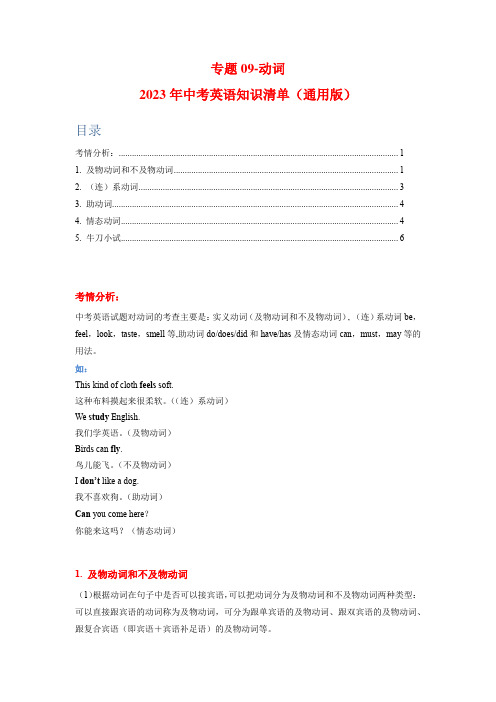
专题09-动词2023年中考英语知识清单(通用版)目录考情分析: (1)1. 及物动词和不及物动词 (1)2. (连)系动词 (3)3. 助动词 (4)4. 情态动词 (4)5. 牛刀小试 (6)考情分析:中考英语试题对动词的考查主要是:实义动词(及物动词和不及物动词), (连)系动词be,feel,look,taste,smell等,助动词do/does/did和have/has及情态动词can,must,may等的用法。
如:This kind of cloth feels soft.这种布料摸起来很柔软。
((连)系动词)We study English.我们学英语。
(及物动词)Birds can fly.鸟儿能飞。
(不及物动词)I don’t like a dog.我不喜欢狗。
(助动词)Can you come here?你能来这吗?(情态动词)1. 及物动词和不及物动词(1)根据动词在句子中是否可以接宾语,可以把动词分为及物动词和不及物动词两种类型:可以直接跟宾语的动词称为及物动词,可分为跟单宾语的及物动词、跟双宾语的及物动词、跟复合宾语(即宾语+宾语补足语)的及物动词等。
如:My brother is flying the kite on the playground.(fly后跟单宾语the kite)我的弟弟正在操场上放风筝。
My mother gives me a new bike as the birthday present.(give后跟双宾语me和a new bike)我妈妈给我一辆新自行车作为生日礼物。
The teacher made his students happy by doing some games. (made后跟宾语his students和宾语补足语happy)老师通过做游戏使得学生高兴。
有些双宾语动词间接宾语(人)放在直接宾语(事物)后时,间接宾语前要加to。
2020年中考英语语法复习5《动词与动词短语》-精选
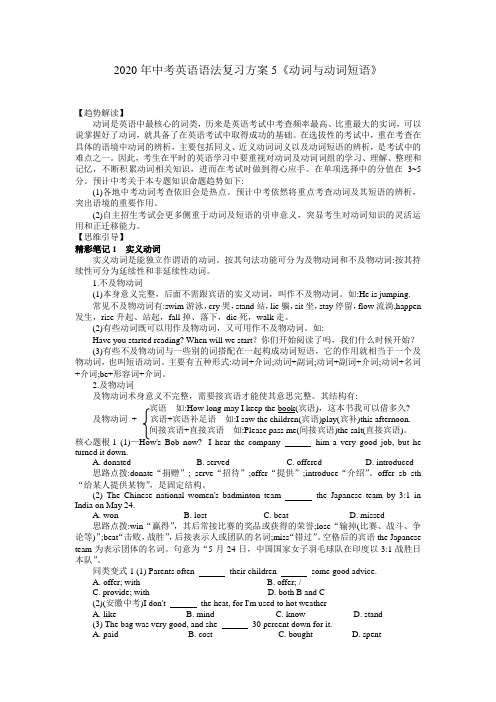
2020年中考英语语法复习方案5《动词与动词短语》【趋势解读】动词是英语中最核心的词类,历来是英语考试中考查频率最高、比重最大的实词,可以说掌握好了动词,就具备了在英语考试中取得成功的基础。
在选拔性的考试中,重在考查在具体的语境中动词的辨析,主要包括同义、近义动词词义以及动词短语的辨析,是考试中的难点之一。
因此,考生在平时的英语学习中要重视对动词及动词词组的学习、理解、整理和记忆,不断积累动词相关知识,进而在考试时做到得心应手。
在单项选择中的分值在3~5分。
预计中考关于本专题知识命题趋势如下:(1)各地中考动词考查依旧会是热点。
预计中考依然将重点考查动词及其短语的辨析,突出语境的重要作用。
(2)自主招生考试会更多侧重于动词及短语的引申意义,突显考生对动词知识的灵活运用和正迁移能力。
【思维引导】精彩笔记1 实义动词实义动词是能独立作谓语的动词。
按其句法功能可分为及物动词和不及物动词:按其持续性可分为延续性和非延续性动词。
1.不及物动词(1)本身意义完整,后面不需跟宾语的实义动词,叫作不及物动词。
如:He is jumping.常见不及物动词有:swim游泳,cry哭,stand站,lie躺,sit坐,stay停留,flow流淌,happen 发生,rise升起、站起,fall掉、落下,die死,walk走。
(2)有些动词既可以用作及物动词,又可用作不及物动词。
如:Have you started reading? When will we start?你们开始阅读了吗,我们什么时候开始?(3)有些不及物动词与一些别的词搭配在一起构成动词短语,它的作用就相当于一个及物动词,也叫短语动词。
主要有五种形式:动词+介词;动词+副词;动词+副词+介词;动词+名词+介词;be+形容词+介词。
2.及物动词及物动词术身意义不完整,需要接宾语才能使其意思完整。
其结构有:宾语如:How long may I keep the book(宾语),这本书我可以借多久?及物动词+ 宾语+宾语补足语如:I saw the children(宾语)play(宾补)this afternoon.间接宾语+直接宾语如:Please pass me(间接宾语)the salt(直接宾语)。
【精品真题】山东省青岛市2019年中考英语真题试题(含解析)
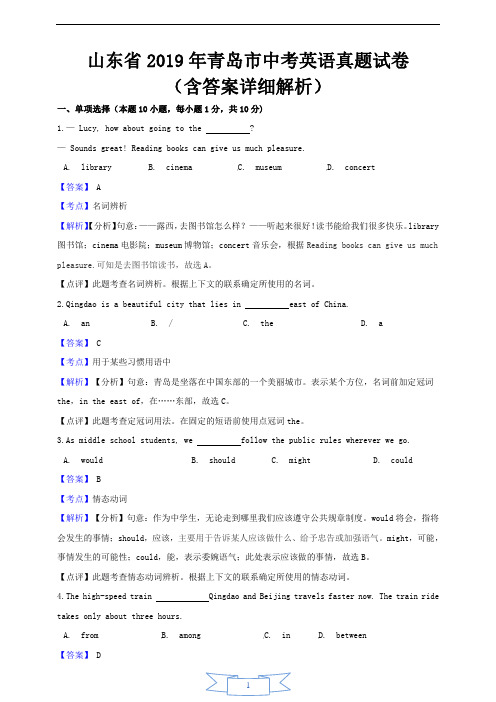
山东省2019年青岛市中考英语真题试卷(含答案详细解析)一、单项选择(本题10小题,每小题1分,共10分)1.— Lucy, how about going to the ?— Sounds great! Reading books can give us much pleasure.A. libraryB. cinemaC. museumD. concert【答案】 A【考点】名词辨析【解析】【分析】句意:——露西,去图书馆怎么样?——听起来很好!读书能给我们很多快乐。
library图书馆;cinema电影院;museum博物馆;concert音乐会,根据Reading books can give us much pleasure.可知是去图书馆读书,故选A。
【点评】此题考查名词辨析。
根据上下文的联系确定所使用的名词。
2.Qingdao is a beautiful city that lies in east of China.A. anB. /C. theD. a【答案】 C【考点】用于某些习惯用语中【解析】【分析】句意:青岛是坐落在中国东部的一个美丽城市。
表示某个方位,名词前加定冠词the,in the east of,在……东部,故选C。
【点评】此题考查定冠词用法。
在固定的短语前使用点冠词the。
3.As middle school students, we follow the public rules wherever we go.A. wouldB. shouldC. mightD. could【答案】 B【考点】情态动词【解析】【分析】句意:作为中学生,无论走到哪里我们应该遵守公共规章制度。
would将会,指将会发生的事情;should,应该,主要用于告诉某人应该做什么、给予忠告或加强语气。
might,可能,事情发生的可能性;could,能,表示委婉语气;此处表示应该做的事情,故选B。
- 1、下载文档前请自行甄别文档内容的完整性,平台不提供额外的编辑、内容补充、找答案等附加服务。
- 2、"仅部分预览"的文档,不可在线预览部分如存在完整性等问题,可反馈申请退款(可完整预览的文档不适用该条件!)。
- 3、如文档侵犯您的权益,请联系客服反馈,我们会尽快为您处理(人工客服工作时间:9:00-18:30)。
中考英语动词搭配辨析中考英语近义动词(词组)辨析1. 辨析take;cost;spend;pay主语为人的有spend和pay;主语为物的有cost;主语常为“it”的有take.(1)spend多用人作主语,后接金钱或时间。
spend…on sth / (in)doing sth,例如:I spent 15 yuan on this new book.(2)take常用于 "It takes sb. some time to do sth" 句型中,例如:It often takes me half an hour to go to school by bike every day.(3)pay常与for连用,表“付给……款”。
例如:I paid 15 Yuan for this new book.(4)cost常用物作主语,表“价值或花费多少钱”,例如:This new book cost me 15 Yuan.【例题】How much money did you in fixing your watch?A. costB. payC. spend2. 辨析bring; take; get; carry(1)bring指将某物或某人从离说话人较远处“拿来”或“带来”,由远及近。
例如:You’d better finish you homework today and bring it to school tomorrow.May I bring Tom along?Bring the book to me, please.(2)take指将某物或某人从离说话人较近处“带到”或“拿到”离说话人较远处,由近及远。
例如:Could you take the book to the classroom? I am busy now.(3)get指从说话人所在位置到别处把某物拿来。
例如:Will you get that book for me?(4)carry不强调动作来去的方向,只说明动作方式,表示“背着、扛着、提着、载着”等含义。
例如The buses and taxis are carry people here and there.The box is so heavy that the little boy can’t carry it.【例题】I don’t know where Wenchuan Country is.---- Let me a map of China for you.A. takeB. bringC. fetchD. carry3. 辨析take part in;jointake part in 指“参加某活动、比赛”。
join 指“加入某组织或人群【例题】Many famous pop stars the charity show.A. joinB. take part inC. took part in4. 辨析put on;wear;dress ;input on 表“穿上”,强调穿衣的动作,后接衣服作宾语,代词放中间。
Here is your coat. Put it on, Lucy.He put on his new pair of sunglasses and went out.wear 表“穿着”,强调穿的状态,后接衣服作宾语。
-“What is she wearing?”- “She’s wearing a red hat and a blue jacket.”dress 表“给…穿衣服”,宾语为人。
My mother is dressing herself.My little brother is too young. Mom dresses him every morning.in 后多接衣服的颜色,表示“穿着……颜色衣服的”。
例如:The man in black is my father.Have you seen a boy in a red sweater?【例题】Can you_____ your little brother? I’m busy now.--- OK. I’ll do it right now.A. wearB. put onC. dressD. in5. 辨析have been to; have gone tohave been to 表“曾经去过某地”(已经回来了)。
have gone to表“已经去了某地”(还没回)【例题】Maria is wanted on the telephone. Where is she?---- She ________ the library. You can find her there.A. has been toB. has gone toC. has leftD. will leave6. 辨析tell; talk; say; speaktell表“告诉,讲述”,多为及物动词,后面多接两个宾语。
I will tell him the news as soon as he comes back tomorrow.Granny often tells me funny stories.The policeman told us not to play football in the street again.talk表“交谈、谈论”,talk多是不及物动词,常与with/to/about搭配使用再接宾语。
如:They are talking about their friends now.I will talk to your father about your health next time.Mr. Zhang is going to give us a talk at the meeting.say表“说”作及物动词,后接说话的内容做宾语。
Did you say goodbye to your granny?speak表“讲”后接某种语言作宾语,打电话时常用它表示说话,也有“演讲”的意思,不强调说话的内容。
We can speak Chinese and English.May I speak to Henry?He will speak at the meeting tonight.【例题】Our English teacher often us stories in English.A. tellsB. speaksC. talks7. 辨析look up;look for;find;find outlook up 表“查找”后接“词典、书、电话簿”等。
look for 表“寻找”强调找的动作。
find 表“找到”强调结果。
find out 表“找出,发现,查明”。
【例题】What's the matter ?----I am having trouble ____ who has taken my book.. (2008山东青岛)A. findingB. looking forC. finding outD. looking up8. 辨析reach; arrive; get这三个单词都可表“到达”,但只有reach是及物动词,后可直接接地名.We reached Shanghai at eight on Monday.arrive 须与in/at连用,arrive in+大地名,arrive at+小地名.We have already arrived in Shanghai.They arrived at school at 6:30 yesterday.get须与to连用,即 get to+地名。
I got to the Capital Cinema at 9:00.注意:当表示到达here, there, home时,arrive或get后不要加介词。
When did you get home? When will you arrive there?【例题】It's reported the Olympic flame for 2008 Beijing Games________Beijing International Airport on March 31, 2008.A. reached toB. arrived atC. got atD. entered in9. 辨析lend; borrow; keepborrow指其逻辑主语从别处或别人那里“借来”东西,常与介词from连用。
例如:May I borrow some money from you?You can borrow books from the library.lend指其逻辑主语将东西“借出、借给”别人,常与介词to连用,lend sth. to sb.把某物借给某人。
例如:Could you lend me some money?The library lends books to the students.keep指“保存”,是延续性动词,与表示一段时间的时间状语连用,而其它两个是非延续性动词。
例如:How long may I keep the book? I have kept the book for 3 weeks.【例题】You have my dictionary for two weeks.A. lentB. borrowedC. kept10. 辨析forget; leaveforget表“遗忘某物”,后不接地点。
leave表“把某物遗忘在某处”,后接地点。
【例题】This morning I went to school in such a hurry that I my notebook at home.A. leftB. forgotC. lost11. 辨析receive; acceptreceive的意思是“收到了……”,只表示收到某物,并不表明同意或不同意接受的含义。
例如:I received a gift from her, but I returned it back to her this morning.accept表示“接受……”,“同意接纳……”。
如接受物体、邀请、批评等,反义词为refuse。
He received an invitation from her and accepted it happily.【例题】I _________a strange gift yesterday, and I still don’t know who it was from.A. tookB. acceptedC. receivedD. brought12. 辨析win;beatwin表“赢”,后面接的不是被打败的对手,而是比赛本身、游戏、战争、名次、奖品等。
